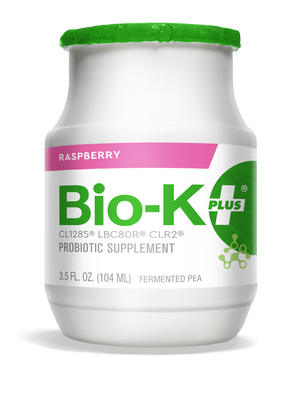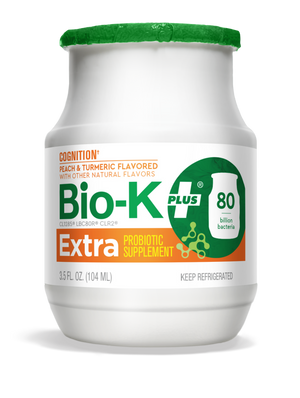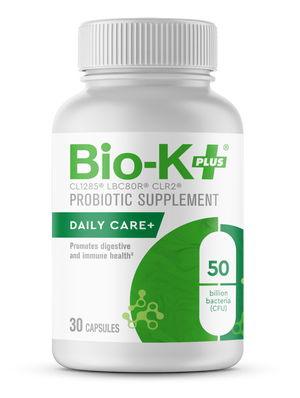How to Improve Digestion Naturally
Fatigue, digestive issues, weight issues, and sleep disturbances are common for most adults, but these can also be symptoms of harmful bacteria in the stomach. Gut health is more important to your overall health than you may know. By incorporating healthy eating and living habits to your daily life, you can improve your digestion and overall health. In this article, we will talk about what happens when your intestinal flora is unbalanced, educate you on different types of probiotics (drinkable probiotics and probiotic capsules), and explain how you can help change the direction of your digestive health.
What are the symptoms of an unbalanced intestinal flora?
Some common symptoms of the presence of bad stomach bacteria seem apparent, like an upset stomach, indigestion, diarrhea, constipation, bloating, etc. There are other symptoms, though, that you may find surprising. The following are a few symptoms that can be caused by an unbalanced flora in the gut you may not expect.
Sleep Issues
What adult does not have sleep issues at one point in their life? Well, an unbalanced intestinal flora can add to these problems. Sleep disturbances and fatigue can be caused by several digestive problems that may be obvious at the time or lay just under the surface.1
Skin rashes and allergies
There may be a link between intestinal dysbiosis and development or flare-up of dermatitis (eczema), and even acne, but the evidence is still weak. We should know more about the gut-brain skin axis in the upcoming years.2
Mood Disorders
Depression and anxiety are more common in American adults than ever before. Some researchers strongly believe there is a connection between the increase in mood disorders and our gut health. Ninety percent of serotonin is manufactured in the digestive tract and not the brain. Gut bacteria also produce dopamine, norepinephrine, acetylcholine, and GABA, which are all critical for regulating mood.3
How to rebalance your gut microbiota
Now that you know what an unbalanced microbiota can cause, the question is, what can you do about it? Knowing of how to improve digestion can help you make many natural changes to your diet and daily activities. These changes may help you eliminate the harmful bacteria in your gastrointestinal (GI) system and build a healthier gut.
Stay Hydrated
Staying hydrated is the easiest and cheapest thing you can do to help your body function properly. There is no set recommended quantity of fluids to consume in one day, it all depends on your activity level, age, sex, size, etc. A good indicator to know if you drink enough water is the color of your urine - it should be pale yellow. If it is any darker than that, drink more! Foods like fruits and vegetables also contribute to your fluid intake.
Change your eating habits
Are you someone that experiences acid reflux or irregular bowel movement after eating? Both can be signs of digestive issues that may be a result of your eating habits. There are around 40 trillion bacteria in your body, known as your gut microbiota or gut flora.4 The food you eat dramatically affects the bacteria in your body and can harm or restore healthy gut flora. If you’re looking to learn more about how to restore healthy gut flora, we’re here to help.
A good tip is to focus on shopping around the perimeter of most grocery stores. Here is where you should find fresh and frozen produce, lean proteins, whole grains, and low-fat dairy. While shopping, you should be looking for foods rich in nutrients like prebiotics and fiber. The best food choices for these are the following:
Nuts and seeds
Certain nuts and seeds are a healthy snack alternative and a great source of fiber, protein, and healthy fats. They include almonds, sunflower seeds, walnuts, and flax seeds.
Legumes
Beans and lentils are a great source of soluble and insoluble fiber
Fruits
Fruits have protective antioxidant properties, are a good source of soluble and insoluble fiber, and have a high water content
Vegetables
Vegetables are good for your gut’s digestive process and can provide a wide variety of phytochemicals and fiber.5
Take a probiotic
As we have mentioned, certain foods can add essential prebiotics and probiotics to your digestive system, but in many cases, there are not enough bacterial concentrations in these food sources to entirely balance your gut. Talk to your doctor and dietitian to determine which probiotic strains and dosage is best for you.
Keep moving
If you are like most people, adding time to exercise to your schedule seems impossible, but exercise comes in many forms, and even the simplest movement can help your gut health. Movement of any sort increases blood flow and stimulates the bowels. Take the stairs whenever you can, walk the dog, play with your kid, or go out dancing whenever possible. Being active for just 30 minutes every day helps keep you healthy.
Minimize stress
Along with adding an exercise routine, minimizing stress sounds like a dream to many. Although you cannot eliminate stress entirely from your life, the impact of stress on your gut health and immune system cannot be underestimated.
There are a variety of ways to minimize stress in your life. For some, that may include yoga and meditation, but if that avenue does not interest you, there are other possibilities.
Silence is a blessing in our lives, and with all the interruptions from technology, it can be hard to come by. By simply turning off your phone, iPad, and computer, you will be giving yourself a much-needed break from the constant interruptions and stress a 24-hour connected world can have on your body. While you take in the silence and lack of disruption, pick up a book to read for fun, or take a bath.
Another way to limit the stress in your life is with friends. Going out for coffee, a brisk walk, or massage and facials with friends fulfills our need for connection and can help our body heal from the daily grind.
Conclusion
A few simple changes can help digestive problems, stomach pain, lack of sleep, and mental issues that make every day a little harder. Remove harmful eating habits, staying hydrated, learning about healthy bacteria, decreasing stress, and increasing movement can all have an enormous effect on your gut and overall health. Before making changes to your diet, check with your doctor.
In addition to these changes, you can also consider adding a probiotic supplement to your daily routine to increase healthy bacteria in your gut. Bio-K+® supplements include 50 billion CFUs in each capsule and drinkable probiotic. Bio-K+ probiotics contain a substrate of milk, soy, peas or rice. They were created to make sure the bacteria are protected and delivered efficiently to your gut.
-
Sources:
3 “Gut Bacteria Can Influence Your Mood, Thoughts, and Brain” Psychology Today,, https://www.psychologytoday.com/us/blog/neuroscience-in-everyday-life/201908/gut-bacteria-can-influence-your-mood-thoughts-and-brain
1 Li, Yuanyuan et al. “The Role of Microbiome in Insomnia, Circadian Disturbance and Depression.” Frontiers in psychiatry vol. 9 669. 5 Dec. 2018, doi:10.3389/fpsyt.2018.00669,, The Role of Microbiome in Insomnia, Circadian Disturbance and Depression - PMC (nih.gov)
2 Petersen EBM, Skov L, Thyssen JP, Jensen P. Role of the Gut Microbiota in Atopic Dermatitis: A Systematic Review. Acta Derm Venereol. 2019;99(1):5-11. doi:10.2340/00015555-3008.
Quigley EM. Gut bacteria in health and disease. Gastroenterol Hepatol (N Y). 2013;9(9):560-569.
4 Sender et al. 2016. Revised Estimates for the Number of Human and Bacteria Cells in the Body. PLoS Biol.14(8): e1002533.
5 Slavin, Joanne L, and Beate Lloyd. “Health benefits of fruits and vegetables.” Advances in nutrition (Bethesda, Md.) vol. 3,4 506-16. 1 Jul. 2012, doi:10.3945/an.112.002154, Health Benefits of Fruits and Vegetables - PMC (nih.gov)





